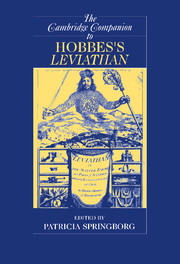Book contents
- Frontmatter
- General Introduction
- Part I: Of Man
- Part II: Of Commonwealth
- Part III: Of a Christian Commonwealth
- 10 Hobbes’s Covenant Theology and Its Political Implications
- 11 Omnipotence, Necessity and Sovereignty: Hobbes and the Absolute and Ordinary Powers of God and King
- 12 Hobbes on Salvation
- 13 Hobbes and the Cause of Religious Toleration
- Part IV: Of the Kingdom of Darkness
- Part V: Hobbes’s Reception
- Bibliography
- Index
- Series List
11 - Omnipotence, Necessity and Sovereignty: Hobbes and the Absolute and Ordinary Powers of God and King
from Part III: - Of a Christian Commonwealth
Published online by Cambridge University Press: 28 November 2007
- Frontmatter
- General Introduction
- Part I: Of Man
- Part II: Of Commonwealth
- Part III: Of a Christian Commonwealth
- 10 Hobbes’s Covenant Theology and Its Political Implications
- 11 Omnipotence, Necessity and Sovereignty: Hobbes and the Absolute and Ordinary Powers of God and King
- 12 Hobbes on Salvation
- 13 Hobbes and the Cause of Religious Toleration
- Part IV: Of the Kingdom of Darkness
- Part V: Hobbes’s Reception
- Bibliography
- Index
- Series List
Summary
In his interpretation of the biblical theme of divine royalty, Hobbes assigns a key role to the concept of omnipotence. Basing his argument on two texts from Psalms which state that 'God is king', he specifically asserts that, 'Whether men will or not, they must be subject always to the divine power'. The link between omnipotence and necessity, alluded to here, is nevertheless to be distinguished from the proper meaning of kingdom, for it is by way of metaphor only that some have called this 'power of God (which extendeth itself not only to man, but also to beasts, and plants, and bodies inanimate) by the name of kingdom'. In the strict sense of the term, kingdom describes government by one alone, by means of speech, and upheld by punishments and rewards. The subjects of this kingdom are those 'that believe that there is a God that governeth the world' - which excludes atheists - and those that believe that God 'hath given precepts, and propounded rewards and punishments to mankind' - which excludes Epicureans. Indirect as it is, the common reference to divine omnipotence and necessity of actions clearly points to the fact that, in the cosmo-theological order, divine omnipotence circumscribes men's actions in the network of causal series, which is itself governed by the principle of necessity.
- Type
- Chapter
- Information
- The Cambridge Companion to Hobbes's Leviathan , pp. 271 - 290Publisher: Cambridge University PressPrint publication year: 2007

